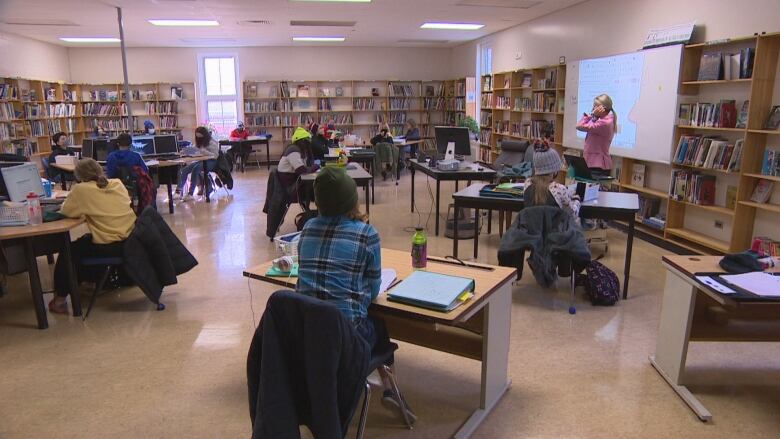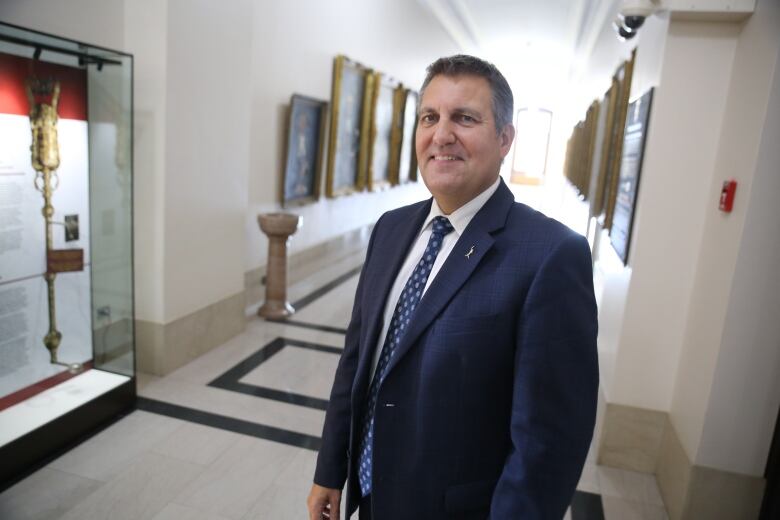Here's what parents need to know about how education is changing in Manitoba
Manitoba provincial government plans to eliminate most elected school boards, merge many school divisions

A huge overhaulof Manitoba's education system is coming as theprovincial government announced a strategy to improve outcomes for students in the province.
On Monday, the province released the"Better Education Starts Today" report, whichwas informed by a comprehensive review ofkindergarten to Grade 12 completed in March of last year.
Manitoba consistently ranks among the lowest across Canada on national and international student assessments for reading, math and science, but Education Minister Cliff Cullen hopes the province will soon boast the "most improved education system in Canada."
But he says it's also a way to allow parents to be more involved.
"The reality is moving forward under this new governance model, parents will have more say at the local school level," Cullen said.

CBCManitoba has compiled the latest information to help Manitoba parents understand whichchanges are being proposed and what that could mean for students:
- No more English school divisions: Divisions will be replaced with 15 regional catchment areas.
- School Community Councils: These parent-run committees will replace school boards and have a say provincially.
- More comprehensive testing:Students will be tested provincially on literacy and numeracy more often.
- Education property taxes to be scrapped: These taxes mean school divisions don't receive the same amounts.
Where will my region be?
Currently, Manitoba has 37 English school divisions. If the provincial strategy moves forward, those school divisions would be dissolved and grouped together in regional catchments.
- Winnipeg, St. James-Assiniboia,Louis Riel,Pembina Trails,Seven Oaks andRiver East Transcona.
- Frontier,Kelsey,Flin FlonandMystery Lake.
- Beautiful Plains,Park West andRolling River.
- Mountain View,Swan Valley andTurtle River.
- Fort La Bosse,Southwest Horizon andTurtle Mountain.
- Brandon.
- Portage la Prairie andPine Creek.
- Prairie Spirit andPrairie Rose.
- Garden Valley andWestern.
- Evergreen andLakeshore.
- Interlake andLord Selkirk.
- Hanover.
- Sunrise andWhiteshell.
- Seine River.
- Border Land andRed River Valley.
The regions will be overseen by a provincial education authority, whichwill handle all collective bargaining in the province, as well as shared services like procurementand remote learning.It will also be responsible for delivering K-12 education in the province, with the regional catchment areasproviding a level of oversight and administration.
The province will appoint between six and 11 people to serve on the council, including at last two who are parents of public school students who serve on a council that advises the authority.
What is a school community council?
The province says school community councils willbe established in every school to advise the principal on school matters, including the needs of the community it serves and strategies for improving student wellbeing.
All parents and caregivers within that school community will be members and they will elect an executive
to work directly with the principal on matters impacting the school community.
One member of a school community council from each of the 15 regions will be elected to the provincial
advisory council on education.
How will these changes impact students?
The province says the changes it'smaking to streamline administration aremeant to free up more money to invest in students and improve their outcomes.
Manitoba students fare poorly in terms of literacy, numeracy and even graduation rates. The province says it wants to change that by doubling down on the curriculum and focus on the foundational knowledge, skills and abilities students need as they grow up.
One way the province plans to test the efficacy of their curriculum is by testing more.
Why more testing?
Currently, there are only provincial tests for math and language artsfor Grade 12 students in Manitoba, and that's something the province wants to change.
The commission is recommending that there be curriculum-based tests of literacy and numeracy throughout primary and secondary school to ensure the system is effective at supporting and improving student learning.
The province says it will implement new provincial assessments in Grade 3 or 4, 6 or 7 and 10, and share that data with local school communities.
How will we pay for these changes?
Education property taxes will eventually be scrapped, and the province will invest more in education, Cullen says.
Currently, these taxes make up 42 per cent of all education funding, but it leads to funding disparitieseven in the same city.
Cullen says the tax model means that some school divisions get more money than others based on the number of homes in the area and the tax percentage, leading to unequal outcomes for students.
In Winnipeg alone, there's a 19 per cent difference in the amount of money school divisions get from education property taxes.
The province expects up to $40 million will be shifted to classrooms from the changes it's making to school divisions and boards.
"If we can streamline the administration, we should be able to move that money shifted from the board table, the administrative level, right to the classroom," Cullen said.
What's next?
Consultations with stakeholders are expected to begin in April and last until June, with an implementation plan ready by fall 2021.
For the time being, the province insists students and parents will not see any immediate changes in their schools. Children will continue going to their schools and the curriculum will remain the same for this year.












_(720p).jpg)


 OFFICIAL HD MUSIC VIDEO.jpg)
.jpg)



























































































